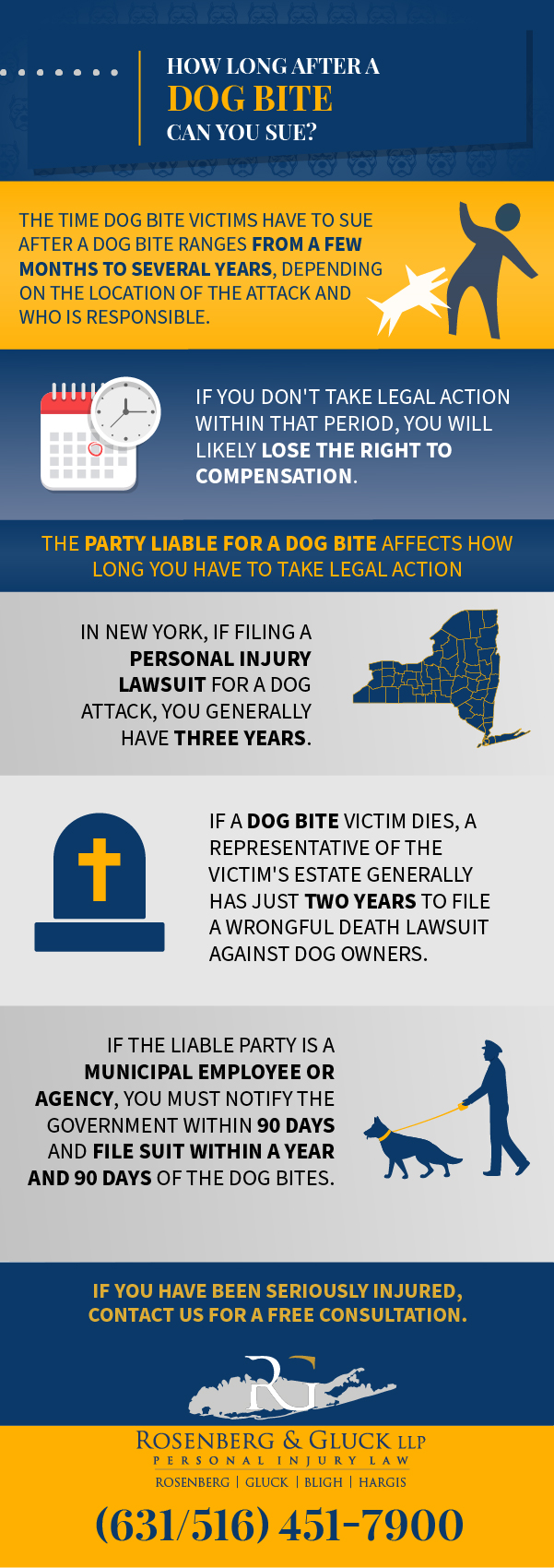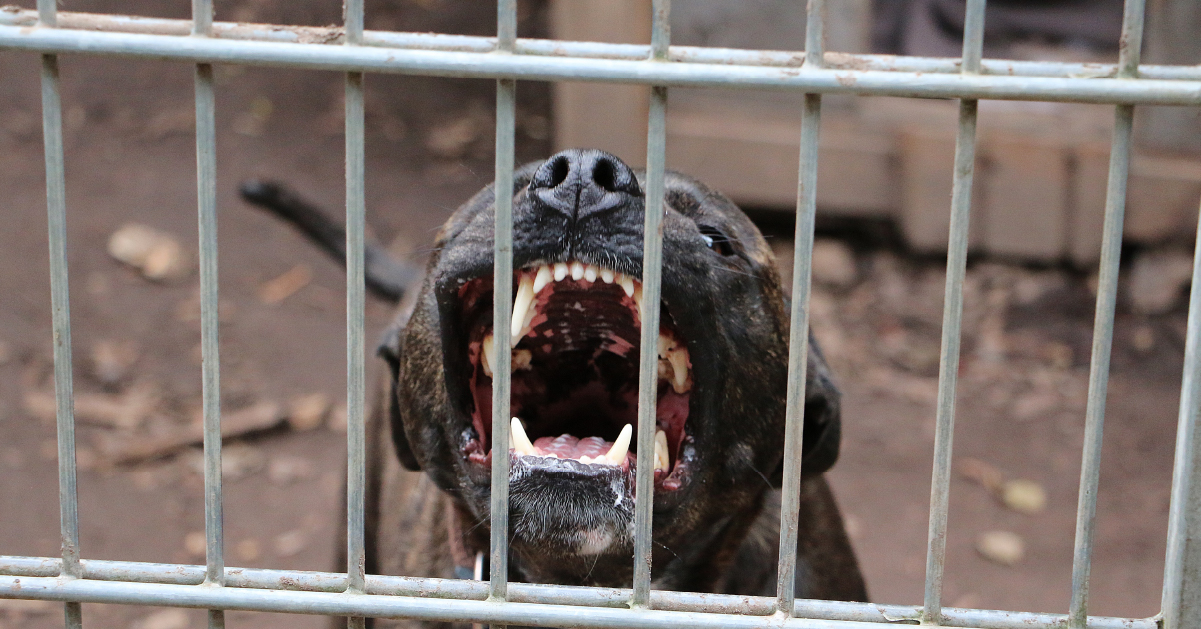
If you or someone you love has suffered a dog bite somewhere on Long Island, contact us today for legal help.
The time dog bite victims have to sue after a dog bite ranges from a few months to several years, depending on the location of the attack and who is responsible. If you don’t take legal action within that period, you will likely lose the right to compensation.
Hiring an experienced dog bite injury lawyer ensures you don’t miss any deadlines and boosts your chances of getting full compensation.
How the Statute of Limitation Works
By New York law CPLR 214(5), the statute of limitations for personal injuries including dog bite lawsuits is three years from the date of the incident. Once this deadline passes, you can’t file suit, and a court will likely dismiss your claim if attempted.
To ensure you meet the deadline in a dog bite case, hire an experienced attorney.

Time Limit Affected by the Liable Party and Other Circumstances
The party liable for a dog bite affects how long you have to take legal action. In New York, if filing a personal injury lawsuit for a dog attack, you generally have three years.
If the liable party is a municipal employee or agency, you must notify the government within 90 days and file suit within a year and 90 days of the dog bites.
The statute of limitations also depends on the harm suffered. If a victim dies from a New York dog attack, a representative of the victim’s estate generally has just two years to file a wrongful death lawsuit against dog owners, unless a shorter statute applies, as noted above.
Exceptions to Statute of Limitation
These are some common exceptions, which may impact how long you have to file a dog bite lawsuit.
Legal Disability
The statute of limitations for filing suit begins when a minor turns 18 or when legal incapacity is resolved in cases other than those with municipal defendants.
Unable to Serve the Defendant
If the at-fault party leaves the jurisdiction and can’t be served, the limitation period pauses until they can be served again.
Quick Legal Action Is a Key to Success
The statute of limitation is an expiration date, not a suggestion for when to start a case. For most dog attacks and bite victims, hiring an attorney quickly after an attack, well before the limitation expires, is crucial for securing maximum compensation.
Here’s why.
It Ensures High-Quality Evidence
The size of your compensation depends on the quality of evidence supporting your claim. This evidence includes any information a lawyer could use in court to prove liability and the amount of your damages.
In a dog bite case, it might include:
- Eyewitness accounts of the attack
- Photos of the attack or location
- Dog’s registration and vaccination records
- Records of other complaints about the dog or dangerous dog designation
- Veterinarian’s report on the dog’s health or danger
- Medical records of your injuries and treatment
- Bills and statements showing your financial losses
As time passes, evidence becomes harder to find and loses quality. Videos and photos get deleted, witness memories fade, and documents go missing. As evidence declines, so do the strength of your case and the chances of fair compensation.
The best way to support a dog bite claim with quality evidence is to hire a lawyer quickly after the incident. A lawyer can promptly start gathering and preserving the evidence needed to prove liability and damages under dog bite laws.
It Communicates the Seriousness of Your Claim
Prompt legal action on your dog bite claim shows at-fault parties and insurance companies that you are serious. Those liable often pay more for a claim pursued immediately than one filed years later. If a dog bite lawsuit case goes to trial, a judge and jury will likely value a promptly filed claim higher than a delayed one. Quick action adds credibility and can lead to a better outcome.
Your Lawyer Might Not Need to Sue to Get Results
Your lawyer can explore various strategies to secure compensation for a dog bite, beyond just filing a lawsuit. An experienced dog bite lawyer might take alternative steps to obtain payment or recover compensation for injuries from a dog attack.
For instance, a lawyer might send a compensation demand to the responsible party or their lawyer before suing. This demand would detail the attack, explain the legal reasons for damages, and request payment for losses. A well-crafted demand could prompt the responsible party to accept responsibility and offer payment.
A lawyer can submit insurance claims for your losses. A first-party claim requests payment from your insurer, while a third-party claim targets the at-fault party’s insurance company. Recognizing liability, insurers may negotiate a settlement with your lawyer.
These options and filing a lawsuit can be pursued simultaneously. A lawyer might recommend multiple approaches to secure payment. Each dog bite case is unique, so it’s essential to have an experienced attorney assess your options.
Who Could Be Liable for a Dog Bite?
Determining liability for a dog attack isn’t always clear. Suing the wrong party can delay compensation and cause you to miss the filing deadline. Let a skilled dog bite lawyer manage your claim to ensure you pursue the right party. A lawyer can investigate your attack and identify who is accountable for your losses. Multiple parties might owe you damages for your dog bite related injuries too.
For example, a lawyer might discover that liable parties include:
- The dog’s owner;
- The dog’s non-owner custodian, such as a dog sitter;
- Service providers (dog walkers, groomers, vet technicians);
- The owner or tenant of the property where the attack happened; or
- An arm of municipal government, such as a municipal shelter or police department.
Determining the at-fault party is key to filing a successful lawsuit. It requires knowledge of local laws and an in-depth analysis of the evidence. Dog owner liability varies by state: some impose strict liability for injuries, while others’ strict liability laws require proof of negligence or prior knowledge of the dog’s aggression.
Hiring a dog bite lawyer gives you an advocate who understands the dog bite law as applicable to your case and can build a claim on your behalf.
What Damages Could a Dog Bite Victim Get?
As a dog bite victim, you can seek compensation for serious physical injury, emotional, and financial harm. You don’t have to wait for damages to accumulate before taking action. A skilled dog bite lawyer can assess your losses and build a strong case for the compensation you deserve.
The precise damages recoverable in a dog bite case depend on its unique facts and circumstances.
In general, a skilled dog bite lawyer can often secure payment for your:
- Medical expenses in treating the bite and any subsequent medical bills for health complications;
- The cost of mental health care to assist in overcoming the trauma of a bite, which is often essential when the dog bit a child;
- Lost income and job benefits from missing work while healing from a bite or caring for an injured child;
- Loss of future earnings and opportunities due to disabilities, scarring, or disfigurement inflicted by the bite;
- Physical pain and discomfort from the bite or necessary medical treatments;
- Attack-related emotional disturbances like lasting anxiety or PTSD;
- Diminished quality or enjoyment of life traceable to the dog bite; and
- Challenges from living with scars, disfigurement, or loss of bodily function.
Your dog bite case could also justify a court award of punitive damages if the at-fault party engaged in extreme or malicious conduct. Consult with an experienced dog bite lawyer today to learn about the scope and amount of damages you could expect to receive.
What to Do After a Dog Bite
After a dog bite attack, to protect your right to compensation:
- Seek immediate medical care, especially if the bite broke the skin (posing a risk of rabies infection) or caused rapid bruising or swelling (which may indicate severe trauma).
- Report the bite to your local animal control or public health authorities, which protects the community and may help you identify the dog’s owner and vaccination status.
- Contact a dog bite lawyer once you’ve addressed your immediate medical needs to ensure prompt, effective legal action.
These steps protect your health and well-being and safeguard your legal rights by creating maximum opportunity for a lawyer to secure evidence, identify liable parties, and develop a convincing case for damages.
Depending on where your dog attack occurred and who’s liable, you may have months to years to file a lawsuit for damages. However, there’s little benefit to waiting. Delaying legal action can hinder your ability to obtain compensation. Wait too long, and you could lose your rights.
Call Rosenberg and Gluck, L.L.P. for a Free Consultation
If you or a loved one sustained serious injuries in a dog attack, don’t delay getting legal support. Contact an experienced personal injury lawyer for a free consultation to understand your rights and options for obtaining a fair dog bite settlement.







